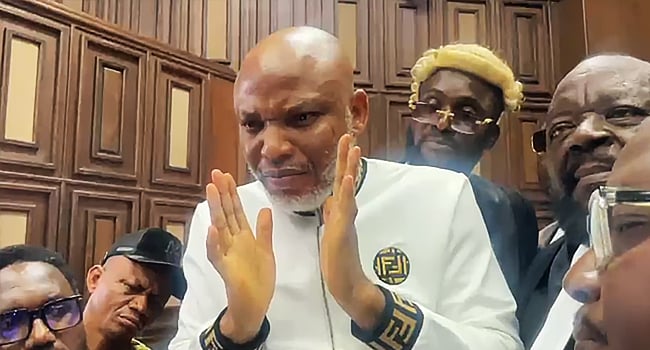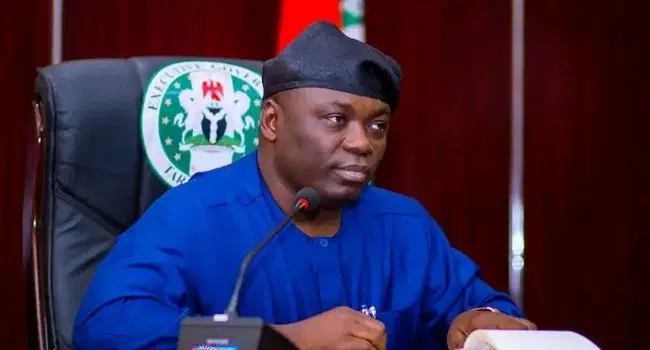In a dramatic proceeding that lasted for over seven hours, Justice James Omotosho of the Federal High Court, Abuja, on Thursday, sentenced the leader of the Indigenous People of Biafra, Nnamdi Kanu, to life imprisonment following his conviction on all seven counts of terrorism charges preferred against him by the Federal Government.
But in a swift response to the development, the South-East leaders said they would explore a political solution for Kanu’s release, calling for calm.
Speaking on behalf of Ndigbo leaders, the Deputy Speaker, Federal House of Representatives, Ben Kalu, stated, “All hope is not lost: Political solution is underway to secure Kanu’s release.”
In a statement by Levinus Nwabughiogu, the deputy speaker’s Chief Press Secretary, Kalu expressed optimism that Kanu would be freed through a political approach.
The South-East leader expressed confidence that President Bola Tinubu would listen to the pleas of well-meaning Igbo leaders on the matter, saying that the President would not be averse to it. He urged the people of the South-East and all Nigerians to remain calm.
“It is now time to explore political solutions that had been hindered because the matter was before the court. But now that the court has finished, it is time to intensify the request for the President’s intervention and we are sure that the President is not averse to it. We are going to get it. All hope is not lost. Our people should remain calm.”
The court proceeding began on a tense note after Kanu interrupted the judge, prompting him to order the security operatives to remove the IPOB leader from the courtroom.
The judge said the session would continue without Kanu after describing his behaviour in court as unruly.
Kanu had interjected during the verdict, insisting that the court could not proceed as he had not filed his final written address.
He raised his voice, demanding, “‘Which law states that you can charge me on an unwritten law? Show me. Omotosho, where is the law? Any judgment declared in this court is complete rubbish.”
He accused the judge of bias and claimed that he lacked an understanding of the law.
After a brief recess, the prosecution, led by Adegboyega Awomolo, urged the court to continue the trial without Kanu, citing his disruptive conduct.
Omotosho stated that while a defendant had a constitutional right to be present during trial, repeated misconduct can allow proceedings to continue in their absence.
“If a defendant misconducts himself or acts in an unruly manner during the course of his trial, his trial can be conducted in his absence,” he said.
He added that the court of justice is a temple of God.
He noted that Kanu’s unruly attitude was not new, as he had previously exhibited similar behaviour several times in the past.
The judge added that the leader of the proscribed group had indicated he would not present a defence, and that Thursday’s session was for judgment and possible sentencing.
Following the order, Kanu was removed from the courtroom, and the judge proceeded with delivering the ruling.
Omotosho, while concluding the judgment in what was the last phase of the proceeding that started at 9am and concluded at about 4:30 pm, sentenced Kanu to life imprisonment in relation to counts one, two, four, five, and six of the seven-count charge.
The seven counts border on Kanu’s secession agitations to disintegrate South-East, South-South and some parts of the middle belt from Nigeria, engaging in acts of terrorism, belonging to a proscribed group, killing security operatives, burning and destroying public properties, concealment, and importing an unregistered radioactive transmitter.
For count three, which relates to the offence of his belonging to a proscribed terrorist group, Omotosho sentenced him to 20 years imprisonment without an option of fine.
On count seven, bordering on his unlawful importation of a radio transmitter for the purpose of broadcasting his activities of Radio Biafra, which is not registered in Nigeria, Justice Omotosho sentenced him to five years imprisonment without an option of fine.
Justice Omotosho said committing acts of terrorism against the country by utterances such as saying “people will die and the nation will stand still” was an act of terrorism which amounts to an offence punishable by death.
Omotosho stated that, “A person who is found guilty of the offence will get a maximum of a death sentence. The death penalty is increasingly frowned upon by the international community. Consequently, and in the interest of justice, I hereby sentence the convict, Mazi Nnamdi Kanu, to life imprisonment on counts 1, 2, 4, 5, and 6 instead of the death penalty.
“With respect to count 3, he is hereby sentenced to 20 years imprisonment with no option of fine, and for count 7, he is sentenced to five years with no option of fine. To extend mercy, I order that the sentences shall run concurrently, “ the judge said.
According to the judge, Kanu’s repeated threats of violence and killings, including his directives enforcing sit-at-home orders across the South-East in various broadcasts, amounted to acts of terrorism under the law.
“The defendant enforced the order of Sit-at-home in the South-East, saying there will be a complete shutdown of Biafraland; Saying I know some of you are foolish, trying to open your shop around 12 noon. If you do that, we will burn you in that shop.”
The judge further held that Kanu’s orders were unconstitutional.
This is an unconstitutional act that is subversive, a notorious act where people in the South-East are made to sit at home, everywhere is deserted, even the farmlands.”
The court also held that Kanu, who said he is the founder and Director of Radio and Television of Biafra, made a broadcast to the effect that the ‘Army of Nigeria will die and that everything called Nigeria will perish in Biafra.’
It equally found him guilty of breaching the terrorism law in several broadcasts in which he threatened the existence of Nigeria, repeatedly referred to Nigeria as a “Zoo”, and promoted the breakaway of the South-East, South-South and parts of the Middle Belt region from Nigeria to form a Biafra nation.
The court affirmed that his orders led to the death of an All Progressives Congress chieftain, Ahmed Gulak, the shutting of businesses, preventing farmers from going to their farms, and, with the South-East being a Christian region, stopping people who are citizens of Nigeria from going to church.


